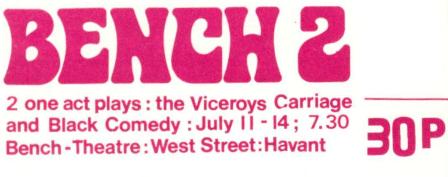The Viceroy's Carriage
Written by Prosper Mérimée
Wednesday 11th July to Saturday 14th July 1973
Directed by Noella Mills
The UK premiere of a play in the classic French tradition which beautifully illustrates the selfishness and incompetence of those in power. "Bench 2" is a double bill with Peter Shaffer's 'Black Comedy' - both plays being performed on each evening.
previous
production
next
production
AuthorProsper Mérimée
Prosper Mérimée (1803 - 1870)
As well as being a dramatist, Prosper Mérimée was a historian, archaeologist, and short story writer. He is perhaps best known for his novella Carmen, which became the basis of Bizet's opera Carmen. He was born in Paris and studied law as well as Greek, Spanish, English, and Russian. He was the first interpreter of much Russian literature in France. Mérimée loved mysticism, history, the unusual, and the mystification, the historical fiction popularised by Sir Walter Scott and the cruelty and psychological drama of Aleksandr Pushkin. Many of his stories are mysteries set in foreign places, Spain and Russia being popular sources of inspiration.
top of page
The Viceroy of Peru, suffering from gout, is confined to his room instead of going to church to attend a magnificent ceremony with the whole town. He is discussing the coquette Camilla Périchole, of whom he is enamoured, when the lady herself is announced. She charms the Viceroy into letting her drive his brand new coach to the ceremony because she wishes to be the envy of all Lima. Instead, she manages to cause a scandal by upsetting another coach. She returns to the viceroy with the Bishop of Lima to inform him that henceforth the coach is to serve to carry the Blessed Sacrament to dying Peruvians. While the infatuated Viceroy admires her pious action, the Bishop delights in possessing so beautiful a coach.
Spain and Spanish literature had become fashionable in Paris in the 1820s. This play was written in 1825 as part of a body of works published together under the title Le Theatre de Clara Gazul (the plays of Clara Gazul). Ostensibly it was claimed that Gazul, a Spanish actress had written the works in her native language, and that they had subsequently been translated in to French by a Joseph L'Estrange. This turned out to be a double-bluff as it was later revealed that neither person had ever existed and the plays were a creation direct from Mérimée himself. Originally published under the title of Le Carrosse du Saint-Sacrement (literally "the coach of the blessed sacrament") this play was adapted into a one-act comic opera in 1920 also called Le Carrosse du Saint-Sacrement and was produced in 1923. The opera was then made in to a film called Le Carrosse d'Or (The Golden Coach) in 1952. As a play, it enjoyed its UK premiere as 'The Viceroy's Carriage' at the Bench Theatre, West Street, Havant, courtesy of Theatre Union.
top of page

Bench Theatre's original name was 'Theatre Union' and was later changed to reflect the name of the theatre in West Street where most of their early productions were staged. This play was performed under the original Theatre Union name and staged at The Bench Theatre building in West Street. Along with Black Comedy, it was part of a double bill staged in July 1973 at that venue, which was their home for nearly 7 years. It was part of a double bill with Peter Shaffer's 'Black Comedy', with both plays being performed on each evening.
| Don Andres de Ribera (Viceroy) | Derek Cusdin |
| Fernandez (Secretary) | Malcolm Wheeler |
| Pedro - a manservant | Clive Wilson |
| Camila Périchola | Julie Morgan |
| Vicar of 'Our Lady of the Bleeding Hearts' | Tony Starr |
| The Bishop of Lima | John Scadding |
Crew
| Director | Noella Mills |
| Stage Manager | Derek Ream |
| Lighting & Sound | Peter Orford |
| Sets | David Lings |
Director's Notes
The play is set in Peru and brings to life the exotic background all the author's skill as a historian. But the characters remain French for all that - they represent the decadent aristocratic society of 18th Century France before the revolution. The Viceroy in particular, illustrates the selfishness and incompetence of those in power. Totally absorbed by his own problems he is the prey of a scheming actress and even the clergy do not hesitate to take advantage of him. The play follows the strict French classical tradition - the story consists of a single plot which is enacted in one place within twenty-four hours.
Noella Mills
top of page
The NewsAnon
Bench Theatre in the dark
The first play [in Theatre Union's double bill] 'The Viceroy's Carriage' shone in the last few minutes with a small but excellent part played by John Scadding as the Bishop picked up the flagging plot and rounded off the play to perfection. In fact two of the most memorable performances came from the two actors with the smallest roles [in both plays] - John Scadding's Bishop in the first play [The Viceroy's Carriage] and Tim Morris's German electricity man in Black Comedy.
The News, 12th July 1973
previous production
next production
top of page
